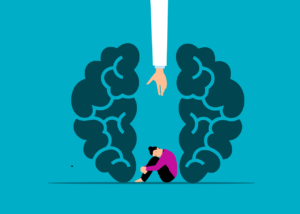In today's fast-paced world, stress has become an ever-present companion for many of us. While stress can sometimes be a motivator, pushing us to achieve our goals, it often oversteps its bounds, becoming a pervasive force that detrimentally impacts our health and well-being.
This phenomenon is deeply rooted in the mind and body connection, a complex interplay that underscores how our thoughts, feelings, and bodily sensations influence each other. Understanding this connection is key to managing stress effectively and fostering a healthier, more balanced life.
Understanding the Mind and Body Connection
The mind and body connection is a concept that captures the intricate and reciprocal relationship between our mental and physical states. At its core, it suggests that our emotional and cognitive experiences do not merely reside in the brain but also resonate throughout our bodies, influencing physiological reactions and overall health. This idea, which intertwines elements of ancient wisdom with cutting-edge scientific research, demonstrates that our psychological state—encompassing thoughts, emotions, and stress levels—can significantly affect physical health, and vice versa.
psychological state can significantly affect physical health, and vice versa.
For example, positive emotions and a healthy mental outlook can bolster immune function and mitigate the physical symptoms of stress. Conversely, physical ailments or discomfort can lead to mental distress, creating a feedback loop that can exacerbate both physical and psychological conditions.
This bidirectional relationship underscores the importance of considering both mental and physical aspects when seeking to manage stress and enhance well-being. It illuminates the necessity of adopting a holistic approach to health, recognizing that interventions aimed at relieving physical symptoms should also address psychological well-being, and strategies for improving mental health should consider the physical body.
The dynamic interplay between mind and body is not only a foundation for understanding stress but also a key to unlocking more effective and comprehensive strategies for managing it, emphasizing the need to nurture both mental and physical health in tandem for optimal well-being.
The Physical Manifestations of Stress
Our bodies have a natural, hardwired response to stress, designed to protect and prepare us for action. This response, often referred to as "fight or flight," triggers a release of stress hormones such as cortisol and adrenaline, setting off a cascade of physiological changes. You might notice your heart pounding faster, your breath quickening, and your muscles tensing up. These reactions are your body's way of gearing up to meet a challenge or escape a threat.

However, when stress becomes chronic, this once beneficial response can start working against us. Continuous exposure to stress hormones can take a toll on the body, manifesting in various physical symptoms. For some, this might mean persistent headaches, muscle tension, or sleep disturbances.
Others may experience more severe consequences like high blood pressure, which is a risk factor for heart disease, or gastrointestinal issues, as stress can alter the gut's functioning. The constant state of heightened alertness can also lead to fatigue, as the body struggles to maintain a sense of normalcy in the face of ongoing stress.
Understanding these physical manifestations of stress underscores the need for effective stress management techniques. Recognizing the signs early and taking steps to mitigate stress can help prevent these physical responses from escalating into more serious health problems. It's a crucial aspect of caring for our overall health, reminding us that managing stress is not just about improving our mental state but also about protecting our physical well-being.
How Stress Affects Mental Health

Chronic stress takes a significant toll on our mental health, acting as a catalyst for various psychological disorders. It can precipitate feelings of anxiety and depression, turning daily tasks into overwhelming challenges. The psychological burden of prolonged stress may manifest as irritability or mood swings, which can strain personal and professional relationships.
Moreover, it impairs cognitive functions, leading to difficulties with memory, decision-making, and concentration. This cognitive decline not only affects productivity and the ability to manage daily activities but also exacerbates the stress cycle, creating a self-perpetuating loop of mental distress.
The brain's response to continuous stress can alter neural pathways, affecting areas involved in emotion regulation and cognitive processes. These changes can make individuals more susceptible to mental health issues and hinder their ability to cope with future stressors effectively.
Thus, recognizing the impact of stress on mental health is essential for breaking this cycle. It involves identifying the early signs of mental fatigue and addressing them through therapeutic interventions, lifestyle changes, and stress management techniques. Engaging in activities that promote mental well-being, such as social interactions that offer support and understanding, can also play a crucial role in mitigating the adverse effects of stress on mental health. It's vital to approach these challenges with strategies that foster resilience, enabling individuals to navigate stress with greater ease and maintain their mental health in the face of life's demands.
Techniques to Manage Stress Through the Mind
To effectively mitigate the impacts of stress, implementing mental strategies is paramount. Mindfulness and meditation stand out as effective practices for tranquility, anchoring us in the present and fostering an attitude of non-judgment towards our thoughts and emotions. These techniques enable us to detach from the incessant chatter of the mind, offering a respite from stress-induced thoughts and worries.
Another potent method is Cognitive-behavioral therapy (CBT), which equips individuals with the skills to recognize detrimental thought patterns that amplify stress. Through CBT, one can learn to reframe these thoughts in a more positive and realistic light, significantly reducing the mental load of stress. Additionally, journaling serves as a therapeutic outlet for expressing thoughts and emotions, facilitating a deeper understanding of personal stress triggers and coping mechanisms. Engaging in creative activities such as painting, writing, or playing music can also redirect focus away from stress, channeling energy into meaningful and soothing endeavors.

Moreover, deep breathing exercises and guided imagery are simple yet powerful techniques that can be practiced anywhere, providing immediate relief by calming the nervous system and reducing the physiological symptoms of stress. These varied mental strategies offer a toolkit for individuals to navigate stress more effectively, highlighting the power of the mind in combating the psychological burdens of stress. By integrating these practices into daily routines, one can foster a resilient mindset, better equipped to handle the challenges and stressors that life presents.
Strategies to Manage Stress Through the Body

Engaging in physical activities stands as a cornerstone for alleviating stress, leveraging the body's innate capacity to enhance mood and decrease tension. Exercise, ranging from brisk walking to more vigorous activities like running or cycling, plays a pivotal role by diminishing stress hormone levels and simultaneously elevating endorphin production, which are crucial for mood improvement and pain relief. Additionally, incorporating practices such as yoga and tai chi can not only improve flexibility and strength but also facilitate mental relaxation and mindfulness, further contributing to stress reduction.
Prioritizing restful sleep is another essential strategy, as it enables the body to recuperate and regulate hormone levels effectively, including those responsible for stress. Creating a conducive sleep environment and establishing a consistent bedtime routine can significantly improve sleep quality, thus supporting the body's natural stress management systems.
Nutrition also holds a key position in managing stress through the body. Consuming a diet rich in whole foods, lean proteins, and an abundance of fruits and vegetables ensures the body receives the necessary nutrients to combat stress. Certain foods, such as those high in omega-3 fatty acids and magnesium, have been shown to reduce stress levels and support overall mental health.
Hydration is another aspect not to be overlooked, as even mild dehydration can increase cortisol levels, thereby elevating stress. Ensuring adequate water intake throughout the day can help maintain optimal physiological function and mitigate stress responses.
Lastly, techniques like deep breathing exercises and progressive muscle relaxation can offer immediate physical relief from stress, by calming the nervous system and reducing muscle tension. These simple yet effective practices can be seamlessly integrated into daily life, providing a quick and accessible means to manage stress physically.
The Importance of a Holistic Approach
Adopting a holistic approach to stress management transcends the typical fragmented tactics, offering a more comprehensive and effective pathway to well-being. Such an approach recognizes that stress is not solely a mental phenomenon nor purely physical; it's the intricate interplay between our minds, bodies, and environment. By integrating strategies that address both the psychological and physical dimensions of stress, we empower ourselves to tackle stress from multiple angles. This method ensures that we're not just putting a temporary fix on symptoms but are addressing the root causes and their multifaceted impacts.
Incorporating mental strategies like mindfulness, cognitive-behavioral therapy, or journaling provides the tools to navigate our thoughts and emotions, crucial elements in the battle against stress. Concurrently, physical interventions, including regular exercise, yoga, and a balanced diet, fortify the body's resilience against the physiological impacts of stress. Together, these strategies create a synergy that amplifies their individual benefits, leading to a more pronounced reduction in stress levels and an increase in overall health.

Moreover, this holistic model acknowledges the significance of our surroundings and social connections in shaping our stress experiences. Building and maintaining a supportive network and cultivating a positive environment play indispensable roles in this comprehensive stress management approach. By valuing the interconnectedness of these elements, individuals can craft a more rounded and personalized strategy to combat stress, one that respects the complexity of the human experience and seeks to harmonize the mind, body, and social context.
The Role of Social Support

Social support plays an indispensable role in stress management, providing a multifaceted buffer against the pressures of daily life. When navigating the complexities of stress, the presence of friends, family, and even colleagues can offer a much-needed sense of understanding, compassion, and solidarity. These relationships provide more than just emotional reassurance; they also serve as a practical resource for advice, assistance, and sometimes intervention, which can be crucial during challenging times.
Engagement with a supportive community can also have tangible physiological benefits. Interactions with those we trust and feel comfortable around can stimulate the production of stress-reducing hormones, leading to feelings of calmness and security. This biochemical response underscores the deep connection between our social environment and our physical well-being, further emphasizing the need for a holistic approach to stress management.
Moreover, the act of sharing our stressors and concerns with others opens up avenues for coping strategies that we might not have considered independently. It allows for the exchange of coping mechanisms and provides perspectives that can reframe our stress in a more manageable light. Additionally, feeling understood and supported can significantly reduce the isolation often associated with stress, reminding us that we are not alone in our struggles.
It's important to nurture these connections actively and to seek out supportive communities, whether through friendship circles, support groups, or online forums, as part of a comprehensive strategy for managing stress. The value of social support in enhancing our resilience against stress cannot be overstated, highlighting its critical role in our overall stress management toolkit.
The Impact of Chronic Stress on Long-Term Health

Chronic stress, if left unchecked, can significantly deteriorate our long-term health, setting the stage for a host of medical conditions. The continuous onslaught of stress hormones like cortisol and adrenaline can wreak havoc on the body's systems, paving the way for heart disease, hypertension, and stroke.
These conditions stem from stress-induced alterations in heart rate and blood pressure, compounded over time. Likewise, the relationship between stress and metabolic disorders is well-documented, with elevated stress levels increasing the risk for type 2 diabetes and obesity. This connection arises from stress’s role in promoting unhealthy eating habits and a sedentary lifestyle, alongside its direct effects on glucose metabolism.
Furthermore, chronic stress acts as a fertile ground for mental health issues, amplifying the risk of anxiety, depression, and other mood disorders. The psychological strain can also disrupt sleep patterns and impair cognitive function, further exacerbating health problems and impacting quality of life. Additionally, stress compromises the immune system, making the body more susceptible to infections and slowing down the healing process.
To safeguard long-term health, it’s imperative to recognize and address chronic stress. This involves not only employing strategies for immediate stress relief but also making lifestyle adjustments that support stress resilience. Engaging in regular physical activity, prioritizing sleep, fostering strong social connections, and practicing mindfulness can all contribute to a more robust defense against the deleterious effects of prolonged stress. By taking these proactive steps, individuals can not only mitigate the immediate discomfort caused by stress but also protect themselves against its long-term health consequences.






